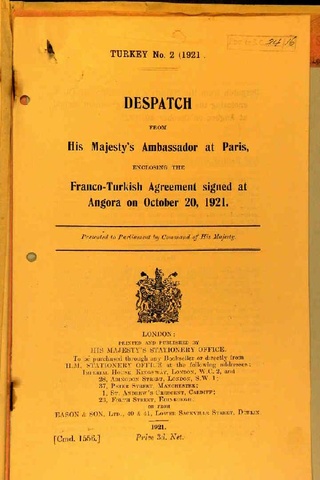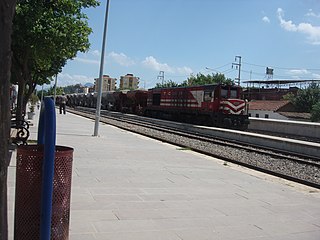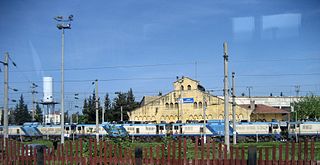
Adana is a large city in southern Turkey. It is situated on the Seyhan River, 35 km (22 mi) inland from the Mediterranean Sea. The administrative seat of Adana province, which had a population of 2.274 million according to the official end-2022 estimates, the city itself had a population of 1,810,646 at that date, making it the fifth most populous city in Turkey.

The Communist Party of Turkey was a political party in Turkey. The party was founded by Mustafa Suphi in 1920, and was soon to be banned. It worked as a clandestine opposition party throughout the Cold War era, and was persecuted by the various military regimes. Many intellectuals, like Nâzım Hikmet, joined the party's ranks. In 1988, the party merged into the United Communist Party of Turkey, in an attempt to gain legal status. The TKP was active from 1920 until its dissolution in 1988, and it was banned in Turkey in 1925 in order to ensure the country's security after the Sheikh Said Rebellion in Eastern Turkey. The party was legalized again after the Second World War, albeit with very limited power and it was heavily monitored by the Turkish government. However, after 1947 it was banned yet again and many of its leading figures were arrested and detained by the authorities. Initially adopting non-violent methods of introducing reform, the party began to adopt revolutionary viewpoints in the 1960s until its dissolution.

Ceyhan is a municipality and district of Adana Province, Turkey. Its area is 1,426 km2, and its population is 158,922 (2022). It is the most populous district of the province, outside the city of Adana. Ceyhan is the transportation hub for Middle Eastern and Central Asian oil and natural gas. The city is situated on the Ceyhan River that flows through Çukurova plain. The Ceyhan River is dammed at Aslantas to provide flood control and irrigation for the lower river basin around Ceyhan.

The Baghdad railway, also known as the Berlin–Baghdad railway, was started in 1903 to connect Berlin with the then Ottoman city of Baghdad, from where the Germans wanted to establish a port on the Persian Gulf, with a 1,600-kilometre (1,000 mi) line through modern-day Turkey, Syria, and Iraq.

The Ankara Agreement (1921) was signed on 20 October 1921 at Ankara between France and the Grand National Assembly of Turkey, ending the Franco-Turkish War.

Turkey has a state-owned railway system built to standard gauge which falls under the remit of the Ministry of Transportation and Infrastructure. The primary rail carrier is the Türkiye Cumhuriyeti Devlet Demiryolları (TCDD) which is responsible for all long-distance and cross-border freight and passenger trains. A number of other companies operate suburban passenger trains in urban conurbations.

The Communist Party of Turkey is a communist party in Turkey. It was founded as the Socialist Power Party on 16 August 1993. In 2001, the party changed its name to the Communist Party of Turkey (TKP) and took over the historical legacy of the TKP.

The Adana–Mersin Main Line is a 67 km long double track rail line from the Adana Railway Station in Adana to the Mersin Railway Station in Mersin. The line passes through the city of Tarsus and has branch lines to the Port of Mersin. The line is one of the busiest rail lines in Turkey with 57 passenger trains and about 20 freight trains daily.
The Port of Mersin, is a major seaport located on the north-eastern coast of Mediterranean Sea in Mersin, southern Turkey. As one of the largest harbors in the country, it is Turkey's main gateway to the Mediterranean Sea. It was constructed during the 1950s as a major government project. It is the country's second largest port after Ambarli, near Istanbul. Owned by the Turkish State Railways (TCDD), its operating right is transferred on May 11, 2007, to PSA – Akfen consortium for a period of 36 years.

The history of rail transport in Turkey began with the start of the placement in 1856 of a 130 kilometres (81 mi) railway line between İzmir and Aydın. The first finished Ottoman railway line was a 66 kilometres (41 mi) line between Köstence and Boğazköy built in 1859–1860.

The State Railways of the Republic of Turkey, abbreviated as TCDD, is a government-owned national railway company responsible with the ownership and maintenance of railway infrastructure in Turkey, as well as the planning and construction of new lines. TCDD was formed on 4 June 1929 as part of the nationalisation of railways in Turkey.

Mersin station is the main railway terminal in the city of Mersin, Turkey. The station is located in the ilçe (district) of Akdeniz. The station is in use since 1886.

Adana station is a railway station in Adana and one of the major railway hubs in Turkey. The station is located at the İstasyon Square, in Kurtuluş, Seyhan.

The Turkish State Railways operate freight trains on all of their lines. TCDD has a big fleet of covered goods wagons, flat wagons, tank wagons, open wagons and hoppers. TCDD also has a few schnabel cars and crane cars. TCDD carries freight such as bulk, shipping containers, liquids and goods.

Tarsus station is a railway station in the city of Tarsus. Tarsus is a city in Mersin Province, Turkey.

The Adana Conference or Yenice Conference was a meeting between Turkish President İsmet İnönü and British Prime Minister Winston Churchill in a railway car parking on a storage track at Yenice, near Adana on 30–31 January 1943, where Churchill tried to persuade İnönü to join the Allied powers and fight the Axis powers during World War II.

İskenderun station is the main railway station in the city of İskenderun, Turkey. The station is located at 36°35′18″N36°10′54″E. The bus station is to the south west and the harbor is to the north of the station. İskenderun is a port city in the Hatay Province and the station is the southern terminus of the Toprakkale-İskenderun branch line which connects the province to the main line between Adana and Gaziantep. The line was opened to service in 1913 during the Ottoman Empire era.

The Konya–Yenice railway is a 344.7 km (214.2 mi) long, partially electrified railway in southern Turkey. The railway is a major route connecting Turkey's Mediterranean coast to the Anatolian interior as well as the only railway line through the Taurus Mountains. The line begins in Konya and runs southeast through Karaman until turning south at Ulukışla and joining the Adana–Mersin railway at Yenice. The section between Konya and Karaman is classified as a High-standard railway, while the rest of the route is classified as a Conventional railway.
1927 Detentions are widespread arrests made in the autumn of 1927 against members of the Communist Party of Turkey operating undercover in Turkey. After Vedat Nedim Tör, the General Secretary of the TKP Central Committee of the time, handed over the secret party documents and membership lists to the police, a major arrest was made, which included Şefik Hüsnü, who was in charge of the Comintern in Turkey at that time, and the members of the TKP Central Committee, and the 1928 TKP Case was opened. During these arrests, Şevket Süreyya Aydemir, a member of the Central Committee, acted together with Vedat Nedim Tör and later started the Kadro magazine.
The Mersin–Adana–Gaziantep high-speed railway, known officially as the Mersin–Adana–Gaziantep higher-speed railway and abbreviated as MAG, is a 303 km (188 mi) long high-speed/higher-speed railway corridor currently under construction in southern Turkey. Beginning at Mersin, on the Mediterranean Sea, the railway corridor stretches inland to Gaziantep, via Yenice, Adana and Osmaniye. The scope of the project includes the upgrading of three existing railway lines, the construction of a new railway tunnel bypass, and the construction of a new, direct rail-link to Gaziantep.
















